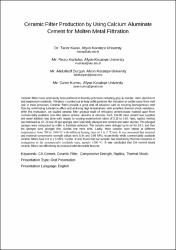Ceramic filter production by using calcium aluminate cement for molten metal filtration
Özet
Ceramic filters have extensively been preferred in foundry processes including gray & nodular, steel, aluminium and magnesium materials. Filtration is carried out to keep solid particles like inclusion or oxides away from melt cast in these processes. Ceramic filters provide a great deal of advances such as ensuring homogeneous melt flow by minimizing turbulence effect and enduring high temperatures with excellent thermal shock resistance. With this motivation, we studied ceramic filter product made of refractory cement based material apart from commercially available ones like silicon carbide, alumina or zirconia. First, CA-80 class cement was supplied and water addition was done with respect to varying water/cement ratios of 0.25 to 0.50. Next, replica method was followed as 10, 20 and 30 ppi sponges were seperately plunged into cement and water slurries. The plunged sponges were compacted by roller to facilitate adhesion. The samples were stringed up in air for 24 h, and then the sponges were plunged into slurries one more time. Lastly, these samples were heated at different temperatures from 700 to 1500 °C with different heating rates of 1 to 5 °C/min. It was measured that minimal and maximal compressive strength values were 0.44 and 0.98 MPa, respectively while commercially available ceramic filters have 0.9 to 1.5 MPa. Further, it was found that our samples had satisfactory thermal resistance in comparison to the commercially available ones, namely 1200 °C. It was concluded that CA cement based ceramic filters can effectively be produced with favorable features.



















